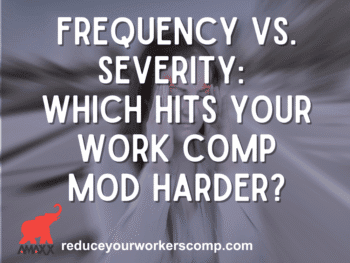Yes indeed – in an employer’s efforts to reduce work comp costs, not knowing is definitely the wrong way to go. Here are six areas you need to know about.
Did you know? You are not off the hook for workers’ comp costs even if you’re not required to buy workers’ compensation insurance.
Many small business owners and sole proprietors are not required to purchase workers’ comp. However, these employers are still responsible for paying any catastrophic claims, except now they have no work comp coverage and all costs are out of pocket. Ouch!
Just because you may not be required to purchase workers’ comp insurance doesn’t mean you shouldn’t. Workers’ comp insurance protects employers because many states have a no fault provision providing workers with appropriate and timely medical treatment, financial compensation for work related injuries. There are, however limits on employer obligations so workers’ comp costs are more predictable and affordable. Workers’ comp insurance policies generally have a statutory limit on employer’s liability, but no limit on employee coverage. Once the policy is put into effect, the insurer is responsible for all workers’ compensation claim benefits allowed by applicable states.
Did you know? You are liable for cleaning staff, painters, and other contractor-non-employees who come to your work sites and are injured there?
Unless you hire contractors who carry their own workers’ compensation insurance you are liable for any injuries. If you are uninsured, you should require proof of workers’ comp insurance from anyone doing work for you on site.
Did you know? Not all states use the experience modification factor to calculate insurance premiums?
Several states use their own modifier based on prior losses and payrolls for sites within that state. These states include California, Michigan, Pennsylvania, Delaware and New Jersey. Contact your state Workers’ compensation Department to determine what these modifiers are and how they are calculated.
Did you know? If you have employees who work or travel in different states you have to adapt your workers’ compensation coverage to each state where you do business?
If you do business in any monopolistic states, states where workers’ comp insurance is state funded, make sure your workers’ comp coverage is appropriate in those states because private insurance is not be acceptable. Contact the workers’ compensation commission or department in each state to determine whether insurance is state run or private. States where workers’ comp insurance is state funded include North Dakota, Washington, Ohio and Wyoming.
Did you know? Not all states have National Council on Compensation Insurance (NCCI) and those that do don’t always have the same operating principals?
Contrary to popular belief, NCCI is not a governmental operation. NCCI is owned by several major insurance companies. NCCI is responsible for developing all the variables that go into determining your workers’ comp premium including job classifications, experience mods, and other data.
Because it is privately owned and not governmental, there is a good deal of interstate latitude in how NCCI policies are applied. Some states don’t use NCCI, preferring to use independent ratings. Other states in which NCCI is implemented, tweak the rules to meet their own needs.
Because it is privately owned and not governmental, there is a good deal of interstate latitude in how NCCI policies are applied. Some states don’t use NCCI, preferring to use independent ratings. Other states in which NCCI is implemented, tweak the rules to meet their own needs.
It is your responsibility to find out if you operate in NCCI states, and if so, to what degree do the NCCI ratings differ from one state to another.
Did you know? You may be in an assigned risk plan.
Small businesses can unwittingly be put into an assigned risk plan, meaning (in many states) paying much higher premiums, ineligibility for premium discounts, limited services and little or no choice of insurer.
How can you change this? Sit down with your insurance contact, find out who is insuring you. Determine if your experience mod is above 1.0. Determine if your loss history is a factor. Then implement a solid aggressive workers’ compensation management program. Begin by taking a workers’ comp management assessment to identify your strengths and weaknesses. Take the recommendations that accompany the assessment and develop an implementation timeline and stick to it. (workersxzcompxzkit)
Break out your workers’ comp policy program procedures and practices and bring awareness of your policies to every level of employee in every state. The beauty of the workers’ compensation management program is, despite state differences, it is implementable everywhere.
The same ten cost drivers push costs up in every state, and those drivers can be brought into control using the same basic strategies you adapt to your unique work structure and culture.
Author Robert Elliott, executive vice president, Amaxx Risks Solutions, Inc. has worked successfully for 20 years with many industries to reduce Workers' Compensation costs, including airlines, health care, manufacturing, printing/publishing, pharmaceuticals, retail, hospitality and manufacturing. He can be contacted at: Robert_Elliott@ReduceYourWorkersComp.com or 860-553-6604.
Podcast/Webcast: Claim Handling Strategies
Click Here:
http://www.workerscompkit.com/gallagher/podcast/ Claim_Handling_Strategies/index.php
FREE WC IQ Test: http://www.workerscompkit.com/intro/
Do not use this information without independent verification. All state laws vary. You should consult with your insurance broker or agent about workers' comp issues.
©2010 Amaxx Risk Solutions, Inc. All rights reserved under International Copyright Law. If you would like permission to reprint this material, contact Info@ ReduceYourWorkersComp.com.



























